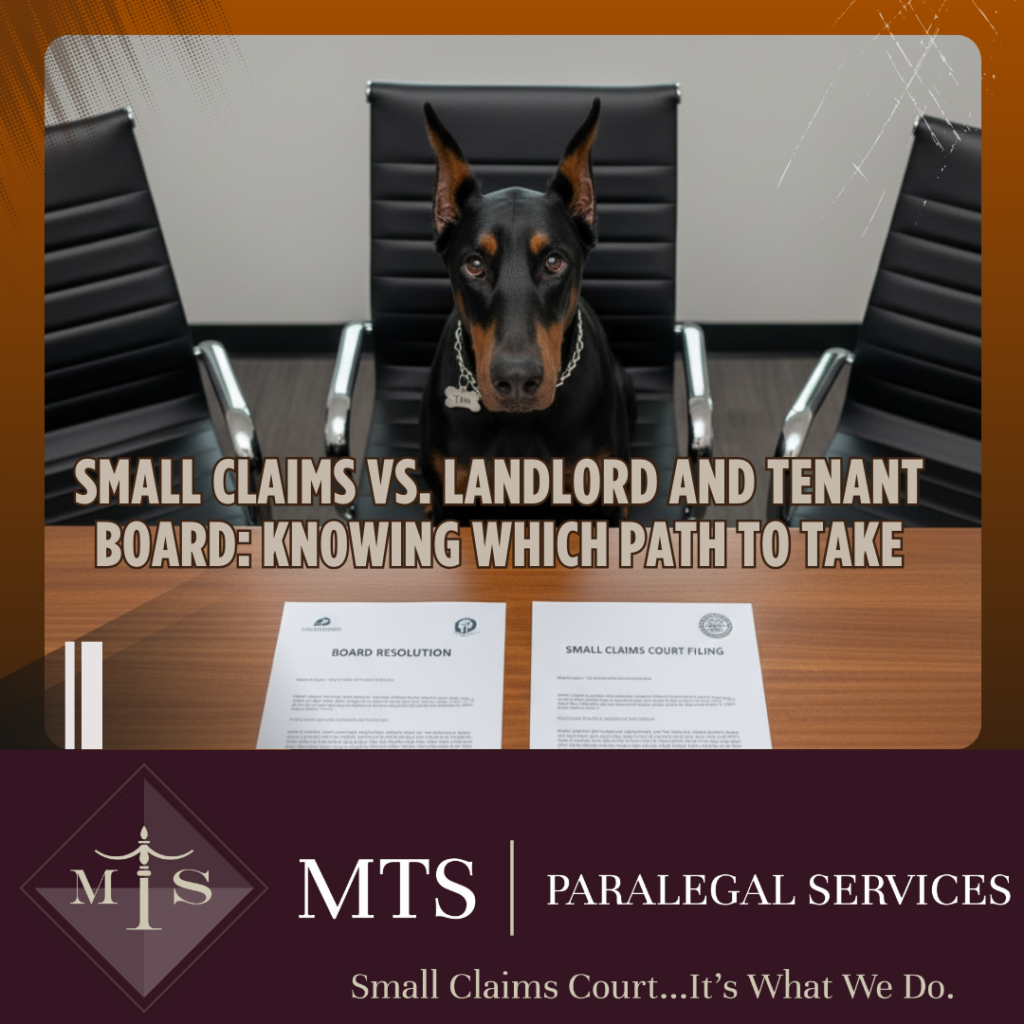
Small Claims vs. Landlord and Tenant Board: Knowing Which Path to Take
In Ontario, disputes between landlords and tenants must be carefully assessed to determine the correct legal forum. Choosing between the Landlord and Tenant Board (LTB) and Small Claims Court is more than a procedural step—it can directly affect the outcome of your case. Filing in the wrong venue may lead to delays, dismissal of the claim, or unnecessary costs. A clear understanding of how jurisdiction is divided between these two forums is essential for landlords and tenants seeking to enforce their rights.
The Role of the Landlord and Tenant Board
The LTB operates under the Residential Tenancies Act, 2006 (RTA) and has exclusive jurisdiction over most disputes arising directly from the landlord-tenant relationship while the tenancy is active. Matters typically addressed by the LTB include:
- Applications for eviction due to non-payment of rent or other breaches of a lease.
- Tenant applications regarding repairs, maintenance, or loss of essential services.
- Claims for interference with a tenant’s reasonable enjoyment of the property.
- Landlord applications for compensation related to damage caused during a tenancy.
- Rent disputes, including above-guideline rent increases.
The LTB has authority to order evictions, direct landlords to complete repairs, and award monetary compensation for issues connected to the tenancy. Its exclusive focus on housing-related disputes distinguishes it from Ontario courts.
When Small Claims Court Is the Right Path
Although the LTB has broad authority under the RTA, it does not have jurisdiction over every type of landlord-tenant dispute. Small Claims Court is often the appropriate venue when the issue falls outside the scope of the RTA. Examples include:
- Claims against a former tenant for unpaid utilities, damages, or debts after they have vacated the unit.
- Monetary claims between parties not governed by the RTA.
- Situations where a landlord seeks remedies that the LTB cannot provide.
Section 87(1) of the RTA specifies that landlords may only apply to the LTB for unpaid rent while the tenant is still in possession of the rental unit. Once the tenant vacates, the LTB generally loses jurisdiction over arrears and damage claims. At that point, landlords must file in Small Claims Court.
As of October 1, 2025, the monetary jurisdiction of Ontario’s Small Claims Court increases from $35,000 to $50,000. This expansion significantly broadens access to financial recovery for landlords and tenants alike. While the court cannot issue eviction orders, it can award damages for unpaid rent, repair costs, and contractual breaches up to this higher limit.
Distinguishing Between the LTB and Small Claims Court
The essential question is: What is the true character of the dispute?
- If the dispute stems from the active landlord-tenant relationship and falls within the RTA (such as eviction for arrears while the tenant remains in the unit), the LTB is the proper forum.
- If the tenancy has ended or the claim falls outside the scope of the RTA (such as pursuing a former tenant for property damage), Small Claims Court is the appropriate venue.
Filing in the wrong forum risks dismissal of the case and loss of valuable time.
Time Limits and Filing Deadlines
Ontario law imposes strict timelines for applications. Most LTB applications must be filed within one year of the alleged event. Missing this limitation period may leave Small Claims Court as the only available forum—provided the dispute falls within its jurisdiction. Acting promptly protects your right to seek relief.
Why Legal Representation Matters
Jurisdictional questions can be complex, particularly in disputes involving both eviction and financial compensation. It is not uncommon for a landlord to require proceedings before both the LTB and Small Claims Court at different stages. A licensed paralegal can determine the appropriate forum, prepare the necessary documentation, meet filing deadlines, and present evidence persuasively before the tribunal or court.
Professional Support for Landlords and Tenants
For landlords and tenants navigating Ontario’s legal landscape, experienced representation is critical. Tim at MTS Paralegal Services provides professional assistance in disputes before both the LTB and Small Claims Court. From rent arrears to property damage claims, Tim ensures matters are filed in the proper forum and that clients’ rights are effectively advanced.
MTS Paralegal Services is located at 15 Schneider Ave, Unit A2, Kitchener, Ontario N2G 1K7. Call (226) 444-4882 or visit MTS Paralegal Services to schedule a consultation.
Small Claims Court, it’s what we do.
This content does not constitute legal advice. For up-to-date guidance or legal advice specific to your situation, please contact MTS Paralegal Services Professional Corporation or call (226) 444-4882.
